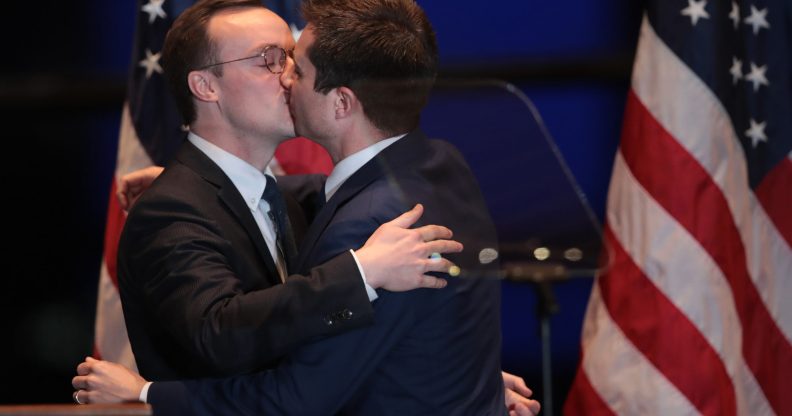5 theories why Pete Buttigieg has dropped out of the race for the White House

Pete Buttigieg kissed his husband Chasten as he announced he had dropped out of the Democratic presidential race. (Scott Olson/Getty)
Pete Buttigieg has dropped out of the race for the Democratic presidential nomination.
Buttigeg announced that he was suspending his campaign on March 1, just hours before the crucial Super Tuesday which will see 15 states decide which candidate they are backing.
After cancelling a planned rally in Dallas, Buttigieg returned to South Bend, Indiana where he told supporters: “Sometimes the longest way around really is the shortest way home.
“After a year of going everywhere, meeting everyone, defying every expectation, seeking every vote, the truth is that the path has narrowed to a close, for our candidacy if not for our cause.”
Tonight I am making the difficult decision to suspend my campaign for the presidency.
The announcement came as a shock to many, prompting fierce speculation from pundits and voters alike as to why he had quit so early on in the race.
Here, we round up some of the most plausible theories.
Pete Buttigieg dropped out to unite the moderate vote.
In Buttigieg’s speech, he signalled that he was dropping out to help centrism defeat the left in the battle for the party’s soul.
“Our goal has always been to help unify Americans to defeat Donald Trump and to win the era for our values,” he said.
“And so we must recognise that at this point in the race, the best way to keep faith with those goals and ideals is to step aside and help bring our party and our country together.”
He’s made a deal with another candidate.
MSNBC and Today Show anchor Craig Melvin suggested that Buttigieg’s decision to drop out is about more than just organising the vote, tweeting that his staff have been in conversation with the Joe Biden campaign “about consolidating support”.
He added that the candidates haven’t spoke directly, but have “exchanged voicemails because they’re both travelling”.
Can confirm Mayor Pete’s people have been talking to VP Biden’s people abt consolidating support. Candidates have exchanged voicemails bc they’re both traveling.
— Craig Melvin (@craigmelvin) March 2, 2020
Already, there is speculation that Biden will announce Buttigieg as his running mate, potentially before Tuesday’s critical vote, although he may have also negotiated a deal for a potential cabinet position.
If a Biden-Buttigieg ticket became a reality, this would heap pressure on Elizabeth Warren to throw her weight behind Bernie Sanders and unite liberal voters around a single candidate.
Pete Buttigieg was running out of steam.
Buttigieg delivered the first shock of the Democratic race when he claimed a narrow victory in the Iowa caucuses.
Suddenly he became a serious competitor, with the early win giving his campaign a new wind and propelling him to further success in New Hampshire, where he tied with Sanders.
This early momentum faltered in Nevada, where he came third, and South Carolina, where he finished in fourth just a day before announcing his exit.
A number of polls had predicted that Super Tuesday would be the point where the wheels came off the Buttigieg campaign (as well as the Amy Klobuchar one), indicating that he dropped out in order to save face.
He couldn’t win over Black voters.
Throughout his presidential bid, Buttigieg struggled to win over Black voters due to his controversial record as mayor, something which would likely have ended his campaign as more and more states voted.
Exit polls suggested that Buttigieg won just 3 percent of the Black vote in South Carolina. Nationally, 19 percent of Democrat voters identify as Black, with a further 22 percent identifying as Hispanic (19 percent), Asian or “other”.
He’ll try again in 2024.
If Buttigieg had won the nomination and beaten Trump in November, he would have become the youngest president in history.
At just 38 years old, Buttigieg is still relatively early on in his political career, a fact that he tried to leverage to his advantage during a number of debates, but might well have backfired.
New York Magazine‘s Gabriel Debenedetti suggested that his decision to exit the race before a potential battering on Super Tuesday “thereby preserves a big part of his reputation and political stature for the future”.
It’s been a long 3 years and the circumstances are obviously very different, but Buttigieg’s choice to get out on the eve of a massive vote—and thereby preserve a big part of his reputation and political stature for the future—is familiar to those who remember the DNC chair race.
— Gabriel Debenedetti (@gdebenedetti) March 1, 2020
In other words, President Buttigieg could still be a reality in four, eight or more years. After all, Donald Trump was 70-years-old when he was inaugurated.

